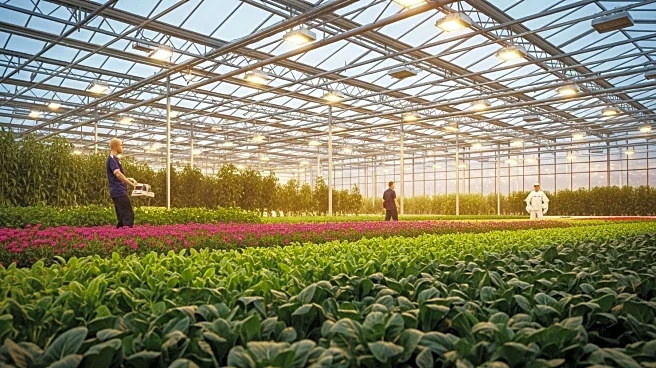What is the story about?
What's Happening?
The World Agri-Tech Innovation Summit is scheduled to return to Dubai on December 8-9, 2025. The event will gather over 300 senior decision-makers from the agri-food value chain. The summit aims to accelerate climate-resilient agriculture and enhance food security. It will showcase scalable innovations in precision farming, controlled environment agriculture, and drought-resilient crops. The summit seeks to drive investment and partnerships to shape sustainable food systems across the Middle East, Africa, and South Asia (MEASA) region. Key topics include regional innovation, agri-talent development, mobilizing capital for climate-smart agriculture, AI, data and precision farming, and more.
Why It's Important?
The summit is significant as it addresses pressing global challenges related to agriculture and food security. By focusing on climate-resilient agriculture, the event aims to foster innovations that can mitigate the impacts of climate change on food production. This is crucial for regions like MEASA, which face unique environmental challenges. The summit's emphasis on investment and partnerships could lead to advancements in sustainable agricultural practices, benefiting both local economies and global food systems. Stakeholders in the agri-food sector stand to gain from the insights and collaborations fostered at the summit.
What's Next?
Participants can expect to engage with global experts and explore new technologies and strategies for sustainable agriculture. The summit will likely lead to new partnerships and investments in climate-smart agricultural practices. Attendees will have the opportunity to download the summit brochure to learn more about the program features and speakers. The event may also influence policy decisions and business strategies in the agri-food sector, promoting a shift towards more sustainable practices.
Beyond the Headlines
The summit's focus on inclusive finance and digital marketplaces highlights the potential for technology to democratize access to agricultural resources. This could lead to more equitable growth in the sector, particularly for smallholder farmers. Additionally, the emphasis on circular and regenerative agriculture suggests a move towards more holistic and sustainable farming practices that could have long-term environmental benefits.


















